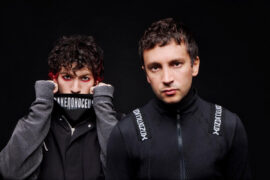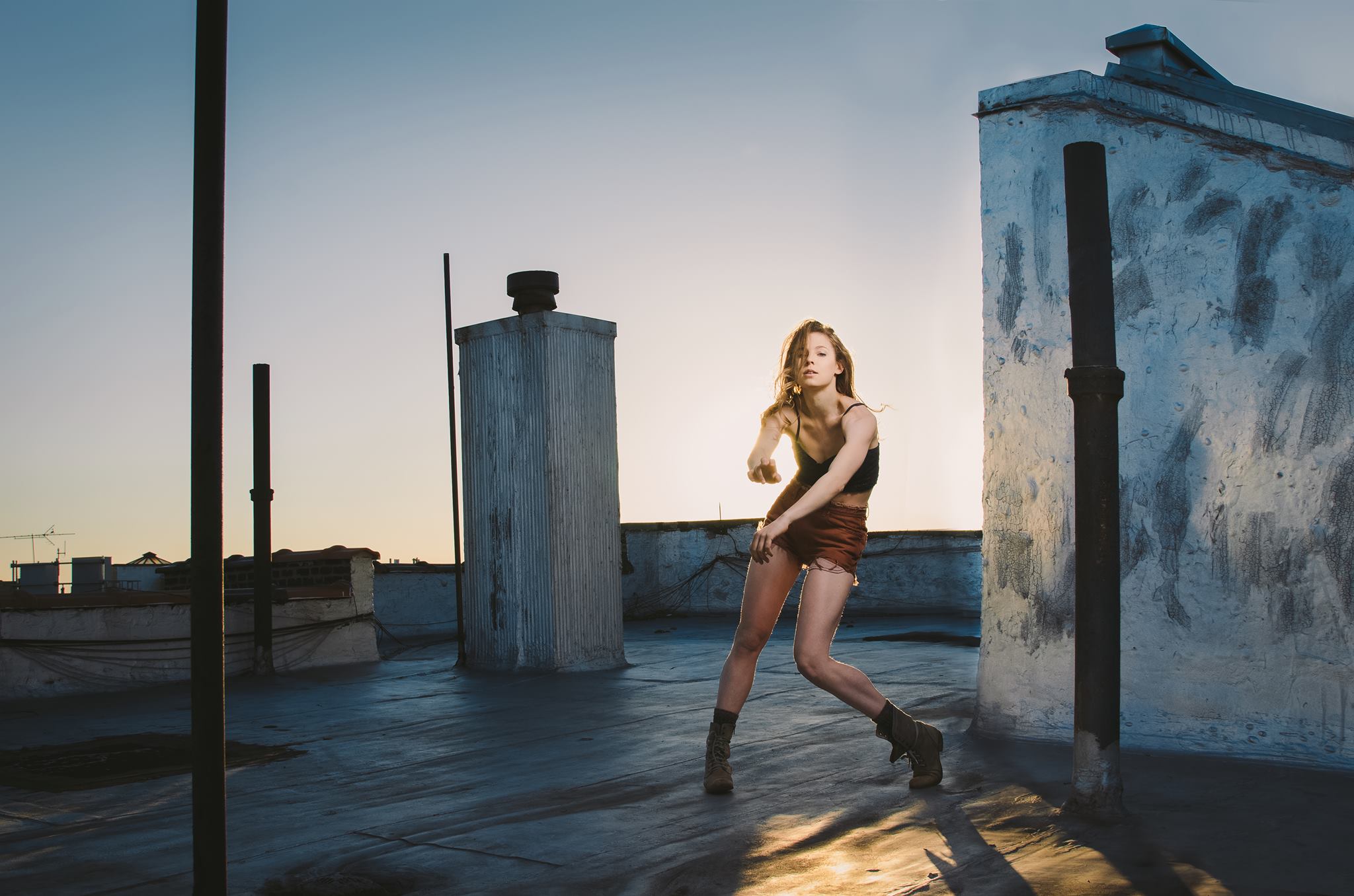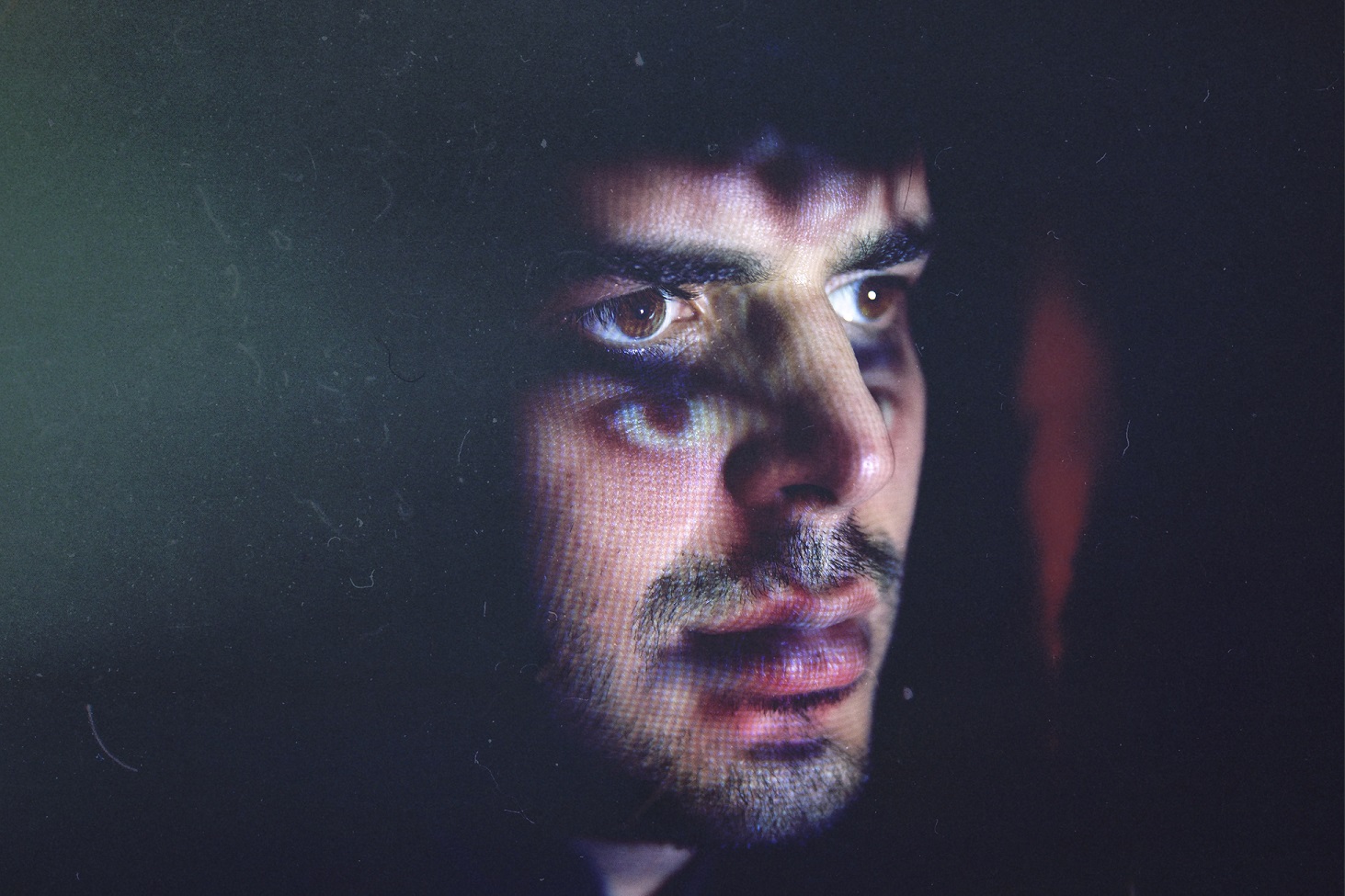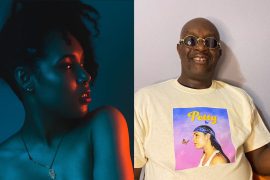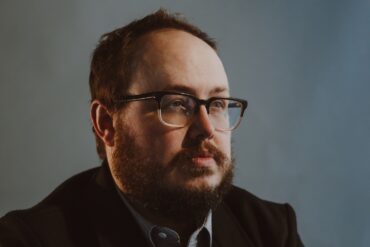Atwood Magazine sits down with Caleb Landry Jones, lauded actor and psych rocker, to discuss his latest videos for “The Moonkey Light” and “Spiders in the Trees” and how his illustrations bring his latest album ‘Hey Gary, Hey Dawn’ to life.
Stream: “Spiders in the Trees” – Caleb Landry Jones
Caleb Landry Jones is, in the most classic sense, a “multi-hyphenate.”
In addition to a Cannes-winning Best Actor turn in Nitram, supporting roles in Get Out, Three Billboards Outside Ebbing, Missouri, Breaking Bad and spot on the founding roster of the X-Men,Landry Jones is a prolific musician. His debut solo project, 2020’s The Mother Stone, was recorded concurrently with its follow up Gadzooks Vol. 1 and released on the Sacred Bones label at the recommendation of filmmaker Jim Jaramusch. Rounding out the series with Gadzooks Vol. 2 and this year’s Hey Gary, Hey Dawn, Jones has amassed a catalog that blends psych rock flourishes with ‘70s horns, grunge vocalizations and acid- tinged poetry.
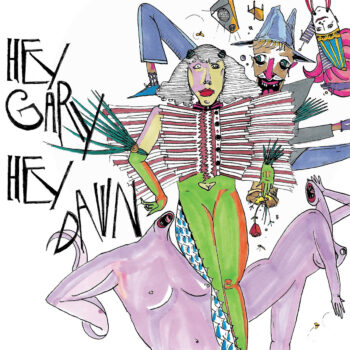
Jones’ music is dense, glitzy, atemporal, intimate and genuinely outrageous. What other record this year has banjos, auxiliary synths, a string section and a cameo from the Price Is Right announcer? Lest Jones rest on his laurels, “idle hands” his are not; Jones provides album art and reference drawings for the animation in his music videos. The whole operation is hand-crafted, multifaceted and deeply immersive.
When I zoomed remotely with Caleb from California, I found him extremely approachable, with shoulder-length hair, a black hoodie on, and rolling paper in hand. Make no mistake, though; his demeanor belied a deep sincerity and intensity about all facets of his craft.
In our nearly half-hour conversation, we discussed the overlaps in his creative pursuits, serendipity, regional and collaborative influences, pushing the constraints of a visual medium and, in a pleasant twist, how Batman brings it all together.
— —
:: stream/purchase Hey Gary, Hey Dawn here ::
:: connect with Caleb Landry Jones here ::
— —
A CONVERSATION WITH CALEB LANDRY JONES
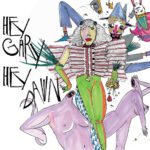
This conversation has been edited slightly for clarity.
Atwood Magazine: Hey, good afternoon! So, kind of a funny story. When your publicist reached out to me, he said, “I have this artist with a really cool animated music video, ‘Moonkey Light,’ and I think you'd be interested.” And I saw your name, and I was like, “I've definitely Googled this name before, why did I Google it?” And then I realized, about 10 weeks ago, I drew you! But it was as Banshee for a big X-Men drawing, when you were Banshee in Matthew Vaughn’s X-Men: First Class. I didn't know that you made music or that you were an illustrator, but it was a very coincidental thing!
Caleb Landry Jones: Oh, great! I wish Aidan Stadler the animator was on this call, too.
Yeah, he's got a great name! So when Aidan is animating your art, how much of that are you drawing beforehand? Are you doing multiple images per frame, or are you just doing sketches that he then adapts?
Caleb Landry Jones: Yeah, I gave him I don’t know how many illustrations, but I made them while I was kind of waiting for the record to get mastered and to go through that process. So I made a lot of drawings, and I wanted to incorporate them somehow with the album, and some of the drawings ended up getting used for the album cover and for some cassettes that was putting out and stuff like that. Or, you know, cause there were some other albums made during [the making of] that album, because a studio album, for me, it tends to take quite a bit of time.
But, yeah, [I just did] a bunch of a bunch of illustrations. I guess you could call them drawings, doodles, you know that I sent Aidan and kind of asked him, cause he did some work on this other video that the Kloster brothers did for a song, “Corn Mine,” on the album and he used the same thing as the other videos. He used illustrations of mine, some corn miners that I drew specifically to be used and so we did it again, but kinda asked him to kind of do whatever he wanted with with the drawings, pick whichever ones he liked, and try and make something with the with the limited budget that that I had to offer him, and he did it all by himself.
Oh, wow!
Caleb Landry Jones: It was literally just him and me, just ‘cause I sent him these images in the 1st place, but he did every, every millisecond by hand, which I was really excited about. He’s an animator that’s still doing a lot of stuff by hand.
The only way I know how to work!
Caleb Landry Jones: Yeah, me, too.
So in your art style there’s few influences I'm kind of seeing. It looks a little bit, Tim Burton-y, and there's also kind of…
Caleb Landry Jones: Is that because of the big eyes on some of the characters?
It could be, and the pointy limbs! There’s also a little bit of the guy who did ‘Fear and Loathing,’ Ralph Steadman, and even a little ‘Yellow Submarine’ in there with the composite creatures...
Caleb Landry Jones: I mean, those are all really beautiful things. Those are all nice. Those are all really distinct and different, thank you.
Listening to these songs in the context of the album, there's influences that you could hear that are like, you know, sixties, seventies, but also some grunge. It all ends up being a little atemporal. How important are those influences in your writing versus just translating the poetry, the art and just making an album that's independent of all those influences?
Caleb Landry Jones: Well, each album has been…yeah. Hmm! It’s hard to [say] on this album particularly. I had just come back from Australia. So I’d been listening to a lot of ‘drums, bass guitar, vocalist’ kind of bands. And so that’s, I think, what made me wanna make some of that kind of music. But then I couldn’t help myself, and this song gets written, and this song gets written, and it’s pretty different than that initial idea of some really guitar- heavy songs. And then it kind of turns into its own thing. And before you know it, there’s a little Southern stuff, and, like you said, kind of the sixties, seventies. But then, some glam… I’m just not really thinking about it so much.
I was, in the beginning, [going] with this idea of the kind of ‘simpler’ songs. Shorter songs. And by simpler, I mean verse/chorus/outro. Nothing too crazy, you know, not two or three bridges or something! But it always turns into what it turns into. And I don’t really try and stop those things, when it gets a bit silly, or when it gets ‘whatever’, [I] just kind of go with it. Then that becomes the record, the record kinda ends up telling you what it is by the time you’re…. You don’t know you’re done until it’s like “Oh!” It becomes apparent that you’re done, whether it’s through limitations of time and money, or you’re just all dried out, or you feel like you said everything and did everything that you were supposed to do for this section, and this bridge, or something like that. But it wasn’t so much “I’m gonna do a little of this and a little of that.”
So the songs that are multi-part suites, and the section that has like the ‘announcer’ voice over, that all comes up organically. Does it start out written like that, or it just evolves as you're putting it in context?
Caleb Landry Jones: Yeah, I wrote that, I think it was in New York. I was over at Jean Stefan’s [place], a director who made one of the music videos for “Spiders in The Trees.” And I think I was playing on his piano. And I played some chords, I think, a few weeks before, or a month before, something in Vienna that I liked where I’d written another song. Yeah, there’s a song called “Your Favorite Song,” I was in Vienna staying at my friend Peter’s place, and I just remember taking a walk. They needed some time to themselves, him and his girlfriend, and I needed to ‘make myself sparse’ if I could. So I took a long walk, and that ended up turning into, you know, kind of singing, which I don’t do very often. But then I went back to his place, and they were still at the beach, so I grabbed his acoustic guitar and started figuring out what I was humming. And so that’s how that song happened.
But I’m not really thinking about it so much, just in my head. “It sounds like The Cure meets, I don’t know, something else.” And then, by the time I’m in the studio it does not [matter]… and then this other song, “Pageant Thieves,” that was in Jean’s bottom floor of his place, which has a bar, and Katya and I stayed there for a while, and we made music videos for the last album with Jacqueline Castel in his basement, and so I was just messing around on the piano, and I felt like I’d had most of the songs, but there’s still a song or two that I was [working on].
There wasn’t something that wasn’t finished, and that song felt like a kind of Lou Reed-y, more on that spectrum of something really simple. It felt like this kind of homage to Queen Bitch and shit like that, but then, before you know it, you’ve got the announcer from The Price is Right, and you’ve got a cat at the end, you know. But I’m not planning for any of that stuff so much.
Does where you're writing the songs affect how they take shape? There are tracks that sound very English, and then some tracks that sound very Country Western. Do you ever write in one style in a disparate place?
Caleb Landry Jones: The last two records were all written in New Mexico in a hotel over a few months. And the Mother Stone was written primarily… actually, I forget. I forget where, that was kind of different spots. But there was one film I was doing where I wrote most of that, I think it was in Toronto, or before that, maybe. But I don’t know if [the place] dictates so much. Sometimes it does heavily, and sometimes it doesn’t at all. And you’re still gonna make an English sounding song, even though you’re not in England, or sometimes it does. Australia influenced me a lot while I was there before I came [back] over, really wanting to make short, fast songs that didn’t have too much instrumentation. And then that kind of disappeared. Certain songs got written or got recorded.
On the same token, when you’re getting into a songwriting headspace and preparing for a role, do you adopt a musical persona in the way that you would adopt a character’s persona?
Caleb Landry Jones: I think it’s the same. I think it’s more like characters ask you to be a certain kind of way, you know. I see Batman behind you. [Caleb gestures to a Tim Burton ‘Batman’ poster in my Zoom background.]
Yeah.
Caleb Landry Jones: Maybe [they] ask you to wear a suit, for a period of time, or to be Bruce Wayne and Batman, and go back and forth between the two every day, you know, every other day, or whatever it is. But I find that music comes out of a necessity of something that I’m not getting while making the movie. But usually it’s just the emotions that, in the movie, you’re kind of gauging where these emotions go, and how much of them come out when and this kind of stuff and you’re usually always left with some stuff that you still need to get out, you know, it’d be good to get it out somehow. But maybe the film doesn’t ask you to get it out that way, and sometimes music is something that’s methodical and quiet and solitary, and sometimes it’s solitary, but it’s mischievous and rambunctious, and it feels archaic, and it feels you’re sweating your ass off, you know, because it’s so hot or something. And it feels like it feels like hard work, and then other times feels like you’re in a cloud or something, you know, drifting around. Making something sweet, usually, or naive, or something.
Recently, I was working on a film Dracula [a Love Tale] and I just had a computer, and I didn’t let myself, you know, get an instrument or anything. But I did find myself doing a lot of stuff on GarageBand with the built in instruments and a keyboard. You know, the keyboard, ‘JFKG.’ And I made a few tunes that way. I found that I needed to. But my mind still needed…. I couldn’t just watch television, that wasn’t good enough, and taking a walk wasn’t good enough. I had to do something, and so [I did] a few drawings, and found myself making a lot of these kind of ‘computer songs,’ or what I’d call computer songs. But that was out of necessity, out of feeling like, okay, “Dracula doesn’t run around. He’s not humming to himself, or maybe he is singing to himself. But then that was something else.”
I guess it's good to have the built in limitations sometimes.
Caleb Landry Jones: So also, he was a character that’s lived for 400 years. So I found myself listening to Hot Chip, and more like what I would call “modern music,” and then I think I found myself wanting to replicate that feeling, or something like that. And all I had were these kind of tones that reminded me of this kind of [sound]. Even though they do all their stuff [with] a lot of analog, this was all these pads and things that come for free on the software. But there’s a lot of limitations in those two.
Yeah.
Caleb Landry Jones: It just all sounds like some video game, you know, some Japanese video game.
Yeah, yeah. Midi guitars always sound like shit. So that can get frustrating. So when I do these interviews writing about the album, and I'm also doing illustrations of the interviewee. Sometimes, I get frustrated when people assume that I do one or the other. So sometimes people tend to pigeonhole you and say, “Okay, so you're an actor, or you're a musician, or you're whatever.” But I find that most artists kind of have their hands in a little bit of everything at once. Do you find it frustrating when people maybe pigeonhole you in an interview, and only want to harp on one specific thing, or does it just come with the trade and doing multiple disciplines?
Caleb Landry Jones: Yeah, it doesn’t bother me so much. It makes sense. It’s logical. The only thing that bothers me is when people want to try and… I don’t know. Usually, although the things are simple, they’re pretty complicated, and sometimes in interviews I find trying to distill something, trying to make something into a “message” of something. That’s frustrating when trying to, like, encapsulate a whole thing, put it into “this is what it’s about. This is what I’m trying to say.” You know, that I find trickier than just having to talk about different things. “What’s it for? What are you trying to say?” Here you go! Oh, man! Oh, no!
Yeah, that does a disservice to the poetry.
Caleb Landry Jones: Well, those are… I don’t know. It’s just frustrating.
Do you plan out in advance, based on your projects that you're going to do an album in ‘X’ year, and then a movie for this set of months, or does that all j happen organically? Do you just write when the moment strikes you, or do you figure that you have a break between movies or projects and slate that time?
Caleb Landry Jones: Yeah, I used to always record every time I was done with the movie, so that I didn’t think about maybe not having another job again, I would just go straight into making music and recording as much of it as possible until “okay, I need you back in Los Angeles to audition for this” or something. But lately I’ve just been kind of “whenever it happens, it happens,” and not pushing it so much. Usually thinking [at first] “it’s shit.” And then, a year later, going, “oh, I like this a lot. It’s stuck in my head.” But yeah, usually I try to plan things, and then everything goes different anyway! So it’s hard to.
You were talking about how there's budget limitations sometimes, and then time constraints. For your next visual or musical, or even acting project, without limitations…I know in the Corn Mine video, there was some model work, and some miniature set building. Where do you think you might want to go next in that vein? What type of video, or visual thing, that you haven't dipped your toe in yet, would you like to in the future?
Caleb Landry Jones: I think the limitations are some of the best things that can happen. ‘Cause they force things to be a particular way, and you have to adapt. And usually, that becomes a more creative endeavor. Then, you know something specific that’s in your head. So I kind of gave up on “I’m shooting for things in that kind of way.” But I’ve been enjoying, Emil Corton Wilson, a filmmaker, came out to Texas when we were doing a residency out there a few months ago. Earlier in the year. And it was great bringing up the High 8, the handheld radio camera or cassette, whatever you call it.
It’s always fun to edit things like that down. So I’m looking forward to getting that camera back in and maybe figuring out the way to… I don’t know. II really like his work, and it was great getting to have him with us, and it’s great getting to see these pieces put together and asking, “What kind of non-conventional way, I guess, or kind of broken way can we use”? But I guess I’m looking forward to anything that I’m getting to work on.
Yeah, that seems like the “creative person's way,” as I'm figuring out myself.
Caleb Landry Jones: Yeah, I’m excited about putting more…I don’t know what you call them. They used to be, there’s probably still this great website that just had millions of videos of different o video art from all around the world, different artists. And I don’t know. Music is so nice, like making something in the afternoon and then cutting together a train trip that you took last week to it. It’s fun, you know. I don’t know if it’ll be interesting to anyone else. But yeah. So I’m looking forward to some some of those things, more of those kinds of things.
Awesome! Is there anything that's like coming down the pike that you're really excited about?
Caleb Landry Jones: I’m excited for this Dracula film that’ll come out soon. Danny Elfman, who I love, he’s making the music for the film. [Caleb gestures again at the Burton Batman poster, which Elfman soundtracked.] Very excited, yeah. It was a real honor to get to meet him. He came to the studio for a few days, just to get a feeling of the movie and what Luc [Besson] was doing. And then, as far as music, I’m looking forward to just more music, and hoping that there will be folks out there that’ll want to hear it!
Yeah, absolutely. Now that we've had this conversation, I have to say, it's extremely surreal, but through no planning of my own. I just watched X-Men: First Class three times in the last couple of weeks, just through…
Caleb Landry Jones: No, really!
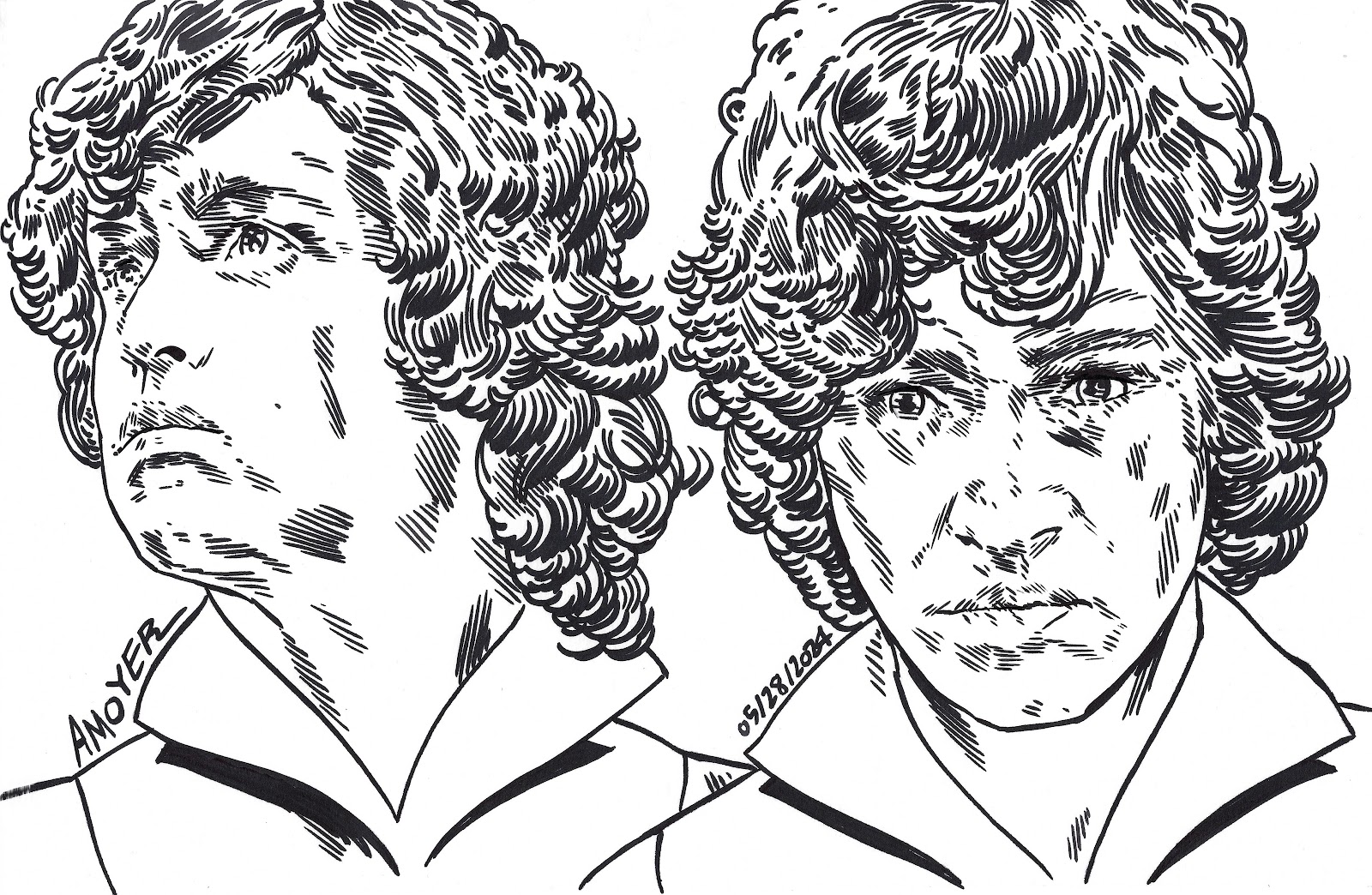
Yeah, through showing it to friends. And it timed out where, basically I turned the movie off and then got the email about having this conversation.
Caleb Landry Jones: You did?
It’s just wild how things work out.
Caleb Landry Jones: That’s how things work out, or that’s how things work. Yeah, I like, when things work like that, it makes me feel like I’m in the right place, or something.
Yeah, absolutely serendipity. Well, thank you so much for taking the time to talk!
Caleb Landry Jones: Well, I appreciate you taking the time and talking to me about this stuff. Have a good rest of the day, Aidan.
My pleasure! You too, take care.
Caleb Landry Jones: Bye, man.
— —
:: stream/purchase Hey Gary, Hey Dawn here ::
:: connect with Caleb Landry Jones here ::
— —
— — — —

Connect to Caleb Landry Jones on
TikTok, Instagram
Discover new music on Atwood Magazine
© Aidan Moyer
:: Stream Caleb Landry Jones ::

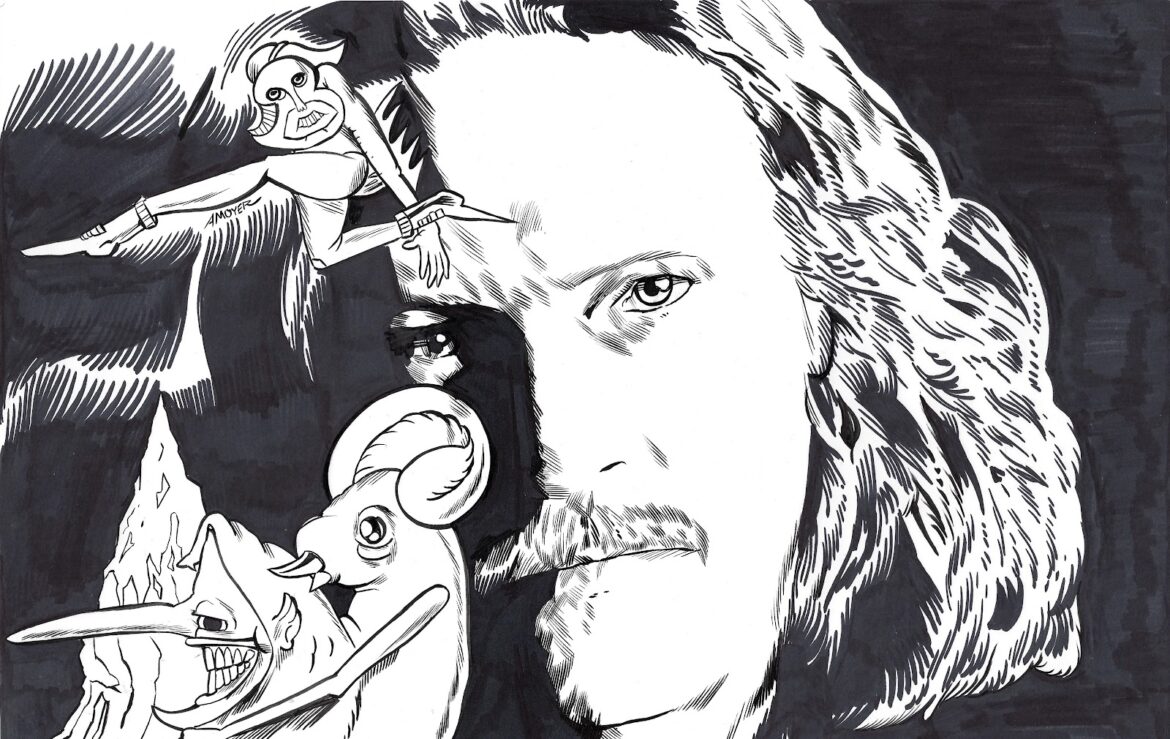
 © Aidan Moyer
© Aidan Moyer